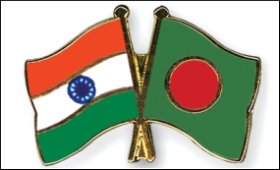|
|
|

|
To boost trade, India, Bangladesh add more water routes
|
|

|
|
| Top Stories |
 |
|
|
|
SME Times News Bureau | 21 May, 2020
To boost trade, economic activity and connectivity, India and Bangladesh
have added five more "ports of call" on either side and increased the
protocol (water) routes from 8 to 10.
"These additions to the
protocol will facilitate bilateral trade with improved reliability and
cost effectiveness for the business community and the people of both the
countries," an official release said.
The release issued after
signing of the Second Addendum to the Protocol on Inland Water Transit
and Trade, in Dhaka on Wednesday, said the extension of protocol routes,
inclusion of new routes and declaration of new "ports of call" would
facilitate trade.
The Second Addendum was signed by Indian High
Commissioner in Bangladesh Riva Ganguly Das and Bangladesh Shipping
Ministry Secretary Mohammed Mezbah Uddin Chowdhury.
There are six
"ports of call" each in India and Bangladesh. The new five "ports of
call" on the Indian side are Dhulian, Maia, Kolaghat, Sonamura and
Jogigopha and on the Bangladesh side Rajshahi, Sultanganj, Chilmari,
Daudkandi and Bahadurabad.
Two more extended 'ports of call" --
Tribeli (Bandel) and Badarpur in India and Ghorasal and Muktarpur in
Bangladesh -- have been added.
According to the release,
connectivity provided by the existing and the new protocol routes is all
the more pertinent in the Covid-19 scenario. They will provide
economical, faster, safer and greener mode of transport for trade and
business.
The new agreement will help improve movement of cargo
vessels in an organised manner on the protocol routes. The Indian
transit cargo is mainly coal, fly-ash, POL and heavy machineries for
power projects in the northeast. The other likely cargo is fertilizers,
cement, grain, farm products and containers.
The export cargo
from India to Bangladesh is mainly fly-ash (around 30 lakh tonnes per
annum). Around 638 inland vessels (including 600 Bangladeshi flag
vessels) do 4,000 loaded voyages annually.
Both the countries
have also agreed to introduce trade between Chilmari (Bangladesh) and
Dhubri (Assam, India) through the use of shallow draft mechanised
vessels.
It will allow export of stone chips and other Bhutanese
and northeast cargo and easy access for traders to the hinterland of
Bangladesh, enhancing the local economy in Bangladesh and the lower
Assam region.
Inclusion of Jogigopha (India) and Bahadurabad
(Bangladesh) as new "port of call" will provide connectivity to
Meghalaya, Assam and Bhutan. Jogigopha (in western Assam) also becomes
important as a multi-modal logistics park is on cards there.
The
new "ports of call" will enable loading and unloading of cargo
transported on the India-Bangladesh Protocol Route and stimulate
economic development of new locations and their hinterland.
Inclusion
of Sonamura (Tripura)-Daudkhandi (Bangladesh) stretch of the Gumti
river (93 km) as IBP route number 9 and 10 in the protocol will improve
connectivity of Tripura and adjoining northeastern states with India and
Bangladesh's economic centres and will help the hinterland of both the
countries.
Before signing of the Second Addendum, Indian and
Bangladesh officials had meetings in October 2018 in New Delhi and in
December 2019 in Dhaka and finalised extension of protocol routes,
inclusion of new routes and declaration of new "ports of call".
According
to the release, this protocol, first signed in 1972 soon after
independence of Bangladesh, is a reflection of shared history, trusted
friendship and mutually beneficial partnership.
It was last
renewed in 2015 for five years with a provision of automatic renewal for
the next five years, giving long-term assurance to stakeholders.
Tripura
Chief Minister Biplab Kumar Deb thanked Prime Minister Narendra Modi
and Bangladesh Premier Sheikh Hasina for the signing of Second Addendum
to improve connectivity and trade between the two neighbours.
|
|
|
| |
|
|
|
|
|
|
|
|
|
|
|
|
|
|
| |
| Customs Exchange Rates |
| Currency |
Import |
Export |
US Dollar
|
₹91.35
|
89.65 |
UK Pound
|
₹125.3
|
₹121.3 |
Euro
|
₹108.5
|
₹104.85 |
| Japanese
Yen |
₹58.65 |
₹56.8 |
| As on 19 Feb, 2026 |
|
|
| Daily Poll |
 |
 |
| What is your primary "Make or Break" expectation from the Finance Minister this year? |
|
|
|
|
|
| Commented Stories |
 |
|
|
|
|
|
| |
|